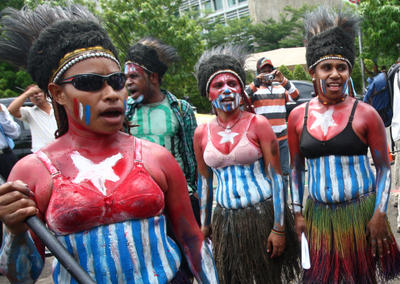One camp is calling on the Indonesian government to take decisive action toward the British government, even if it means freezing diplomatic relations. The other camp is calling for the right to freedom of expression. Looking at the issue closely, two trends are apparent. First, the Indonesian government has been unable to counter the second-track diplomacy undertaken by West Papuan tribal leader and international lobbyist Benny Wenda. Second, and more importantly, relations between the Indonesian central government and the Papuan people are deteriorating, risking the future of peaceful dialogue.
The recent opening of the OPM office in Oxford is consistent with what Wenda has been doing for more than decade since he left Papua for the United Kingdom in 2002. Most notably, in 2008 Wenda established the International Parliamentarians for West Papua (IPWP), a cross-party political group of politicians from around the world who support West Papuan self-determination. He also travelled to Melanesian countries in the South Pacific (Fiji, Vanuatu, Solomon Islands, Papua New Guinea) to garner support. These efforts have internationalised the Papua issue and shone a spotlight on this eastern province of Indonesia. One of the objectives of Wenda’s diplomatic actions has been to pressure the Indonesian government to abandon its current security approach toward solving problems in Papua.
Wenda’s success highlights the weakness of the Indonesian government in exercising its diplomatic instruments. Indonesia seems unable to project an image of sovereignty over Papua. The Indonesian government has responded by strengthening its efforts to cooperate with the Melanesian Spearhead Group (MSG) since this group of countries has spoken frequently about human rights conditions in Papua. But this growing Indonesian diplomatic effort in the region cannot prevent these countries from supporting the expressions of Papuans toward obtaining independence. The Papuan goal was fortified by the MSG giving Papua observer status in their leaders’ meeting on 20 June in New Caledonia. Meanwhile, human rights conditions in Papua have also become a main concern for international agencies, such as Human Rights Watch and Amnesty International, and famous figures, such as Archbishop Desmond Tutu and MIT Professor Noam Chomsky, who have urged the Indonesian government to respect Papuan indigenous rights.
Wenda’s efforts to internationalise the Papua issue, such as through the opening of the OPM office in Oxford, and the weakness of the Indonesian government’s diplomacy impacts the future of peaceful dialogue.
Initially, the idea of peaceful dialogue was launched by the Papuan intellectual Neles Tebay in accordance with The Indonesian Institute of Sciences. This effort culminated in an initiative to use active dialogue to rectify ongoing historical, political, cultural and economic grievances in Papua. By holding workshops and public discussions throughout the province as well as lobbying the national government for support for the enterprise, this strategy pushes for a positive environment under which dialogue can take place through both top-down and bottom-up approaches. However, the challenges are still numerous, including the fragmentation of the large number of parties.
One of the biggest obstacles for consolidating a dialogue is bringing all the relevant parties together for discussion aimed at finding a mutually acceptable solution. Looking back at Papua’s history, there have been many initiatives, spearheaded by central and local government as well as non-governmental organisations, to arrange an active dialogue. But these efforts have faced similar obstacles related to political fragmentation among Papuans. Benny Wenda’s international actions aimed at achieving Papua’s independence jeopardise any potential role the OPM could play in fostering peaceful dialogue between the national government and the Papuan people.
The existence of the OPM’s office in Oxford also makes the road to peaceful dialogue more complex. On the one hand, Wenda will almost certainly refuse to participate in any dialogue conducted under the auspices of the provincial authority of Papua. On the other hand, the British government can do little to disband the activities of the OPM’s Oxford office due to its national laws that respect and guarantee its citizens’ rights—and Wenda is a British citizen. In this situation, ignoring the existence of the OPM office is impossible. All the British government can do is to make a public statement at a diplomatic level affirming its respect for the sovereignty of Indonesia over Papua. For the time being, Wenda and his group look set to continue to campaign internationally for the secession of Papua. But ultimately, constructive communication, including with those who have been exiled, is necessary for peaceful dialogue to forge any meaningful solutions.
In the meantime, until a long-term solution can be agreed, the consternation over the opening of the OPM’s Oxford office must not be used as an excuse to incite an escalation of conflict in Papua. This concern is especially grave considering the recent military shooting and killing of several Papuans on 1 May, which coincided with the peaceful commemoration of the 50th anniversary of the handover of Papua to the Indonesian government by the United Nations Temporary Executive Authority.
Hipolitus Yolisandry Ringgi Wangge is Visiting Scholar in the Equality Development and Globalization Studies Program at the Buffet Center for International and Comparative Studies, Northwestern University.
Agustinus Kambuaya is a faculty member in the department of politics at Cenderawasih University, Jayapura, Indonesia.
A version of this article was published here in the Jakarta Post.

